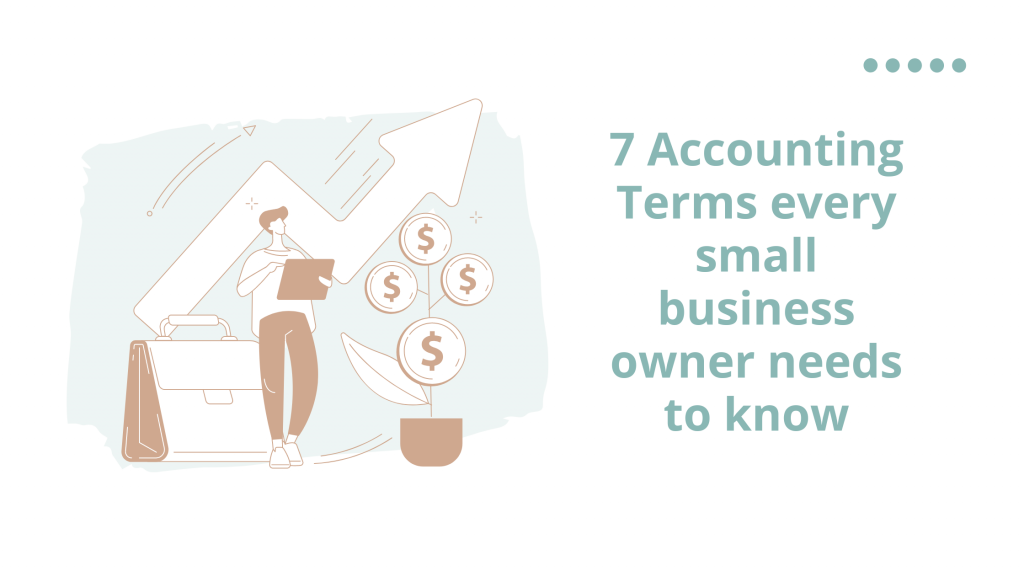There is so much to learn when you start out in business, you are being pulled in every direction and taking in all the information it can be really overwhelming and learning basic accounting terms is 100% not your top priority.
However, understanding accounting basics can be extremely useful so that you can be on top of your finances and build an amazing business.
You might be thinking that you have an accountant or bookkeeper and therefore there is really no need to know any of it and I can see your point but being able to have an open conversation with them and understanding what they are advising can be vital for your business.
So, here are 7 accounting terms to help give you a boost;
1 GROSS PROFIT
Gross profit is simple to calculate: take your total revenue and subtract the cost of goods/services sold.
For example, if you sold £100,000 worth of products but spent £40,000 in order to do so, your gross profit would be £60,000.
2 NET PROFIT
It’s important not to confuse gross and net profit. Gross profit only looks at the direct costs, whilst net profit is the amount left after all business expenses have been deducted, such as marketing, debt repayments, overheads and taxes.
If your gross profit was £60,000 but you spent an additional £20,000 on marketing and overheads like rent, your net profit would be £40,000.
3 INCOME STATEMENT
An income sheet is a document that details your revenue, expenses and net profit over a set period of time. Comparing income statements to other periods can help you to understand how your company is performing, what works well for you and where changes need to be made.
4 MARGINAL COSTS
Marginal cost is the change to your profit margin when you sell one more unit. This allows you to understand whether or not increasing production will prove profitable. However, you should bear in mind that increasing production may also require hiring additional staff or purchasing new equipment.
You can calculate marginal cost by dividing the change in total cost of production by the change in quantity.
Let’s say it costs £100 to produce 10 units = £10/unit.
If it costs £105 to produce 11 units = £9.55 per unit.
Therefore, in this case it would prove more profitable to produce and sell an extra unit.
5 BURN RATE
Your burn rate is the speed at which your cash reserves are decreasing. Knowing your burn rate is an important part of good cash flow management. Your burn rate allows you to calculate the length of time for which you can cover your operating costs if nothing changes in your business. This is a very important metric in terms of your survival and can help you to identify when to cut back or seek additional funding.
6 CASH FLOW
Cash flow is the money entering and leaving your business in a set time period. This includes funds being spent on utilities, salaries and operations as well as money collected from clients or customers.
It’s possible to be profitable and still run out of cash, which is why it’s important to collect payments as soon as possible and time purchases carefully. Remember that a decision which may increase your profits could also damage your cash flow. For example, buying equipment out right rather than taking out an equipment loan may save you money in the long run and thus boost your margins. However, it also requires a large lump sum payment which puts you at risk of running out of cash.
Poor cash flow management is one of the biggest reasons that so many small businesses fail, so it’s important to keep a close eye on your cash flow at all times and strive to keep your accounts flush with funds.
7 CASH FLOW FORECAST
A cash flow forecast is an estimate of how much money will move through your business in the future – over the next three months or year, for example. This can help you to time new purchases and investments carefully to ensure that you always have enough cash to continue operations and protect your business in an emergency scenario.
Whilst successful small business owners are likely to have professional support and guidance from accountants, bookkeepers, mentors and coaches and other professionals, it is still so important for them to have basic knowledge especially when it comes to their finances.
You will get greater insight and be able to prepare your business for the future.
It pays to know your numbers.
Get ahead, get it done.
Get in touch if you would like support with completing your tax return.
Ask me for my FREE 22/23 Tax Return Checklist
Thank you for reading this weeks blog – 7 Accounting Terms Every Small Business Owner Needs To Know.
Flo
